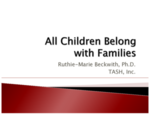Innovative Approaches to Improving Outcomes for Children Involved with Child Welfare: Youth Mentoring
This chapter from Re-Visioning Public Health Approaches for Protecting Children argues that mentoring for children in foster care in the US should be considered as one potential strategy for the prevention of adverse outcomes among this vulnerable population.

